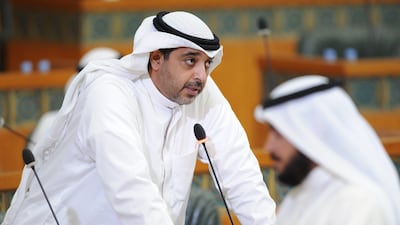The speaker of Kuwait's National Assembly has said there is a high chance the government could resign on Monday amid efforts by opposition MPs to go after ministers over allegations of mismanagement.
In what was a dramatic start to the new parliamentary session, MPs grilled the minister of state for cabinet affairs and acting information minister Sheikh Mohammed Abdullah Al Mubarak on Tuesday over the government's alleged failure to abide by the national budget and to implement legislation.
“I think that the cabinet will not attend the upcoming session of parliament and it might resign, but until an official announcement is made things will continue as usual,” speaker Marzouq Al Ghanim said on Wednesday night after meeting with Emir Sheikh Sabah Al Ahmed.
It comes less than a year after the government was formed.
_________________
Read more:
Kuwait parliament speaker calls Knesset members 'occupiers and murderers of children'
Kuwait MPs draft law to block price increases
Conservatives make strong showing in Kuwait parliamentary election
_________________
Several members of the opposition-dominated National Assembly have pledged to question other ministers over alleged mismanagement following Sheikh Mohammed’s grilling on Tuesday by opposition MPs Riyadh Al Adsani and Dr Abdul Kareem Al Kandari. Previous attempts by opposition-dominated parliaments to pursue governments over such allegations have resulted in the National Assembly being dissolved.
But, after his meeting with the emir who holds the authority to dismiss the 50-member National Assembly, Mr Al Ghanem said he believed parliament would not be dissolved this time around — even if the government announces its resignation.
The ministry of information has historically been an easy target for oppositions MPs.
“In one respect, the opposition parliamentarians are going after individuals or ministries over corruption campaigns that are more realistically able to be held accountable,” said Geoffrey Martin, a political analyst at Gulf State Analytics and a specialist on Kuwaiti politics.
Opposition MPs have said they also plan to question ministers over claims of mismanagement at the Kuwait Oil Company and the ministry of social affairs, but pursuing these larger entities will prove more difficult and risks displaying their ineffectiveness to voters.
CJ Freer, research officer in the London School of Economics' Kuwait Programme, pointed out that the last dissolution of parliament, which took place in October last year, occurred because of a lack of co-operation with the cabinet.
“This by no means would be the first time a parliament has been dissolved in Kuwait due to interpellations (questioning) of ministers," she added.
Voters in Kuwait, however, are unlikely to welcome another parliamentary election, having gone to the ballot box seven times in since 2006.
Kuwait’s constitution stipulates that it is the National Assembly’s right to file requests to summon ministers for questioning, which in the past has often resulted in fierce grillings over corruption allegations and led several ministers to resign in recent years.
In the past, the National Assembly has been bogged down by such drawn-out questioning processes, resulting in MPs neglecting more pressing concerns while still seeming to appear effective to voters.
Mr Al Ghanim urged the other 49 members of parliament to only summon ministers for questioning when absolutely necessary as the “country is threatened by something more serious”.
Sheikh Mohammed also faced questions over government transparency, unemployment levels and the cabinet's alleged failure to manage state projects.
But the minister, who comes from a historically relevant and well-respected branch of the ruling family, appeared to defend himself with ease, with the allegations launched by the two MPs sounding flat and often erring on the sensational.
Several observers said the summoning of the minister appeared to simply be an opportunity for opposition MPs to exercise their right to hold the government accountable.
Despite this, a motion of no confidence in Sheikh Mohammed was filed after the session.
According to local media, around 22 MPs have publicly said they will support the motion to oust Sheikh Mohammed from his post, just three shy of the 25 needed to do so under the constitution.
Mr Martin said accusations of mismanagement levied at the ministry of information by opposition MPs pre-date Sheikh Mohammed's time as acting information minister, however, and have dogged several of his predecessors.
Sheikh Mohammed took up the acting role after Sheikh Salman Sabah Al Salem resigned from the post earlier this year.
The original version of the article incorrectly described Geoffrey Martin as a professor and has been amended accordingly.

